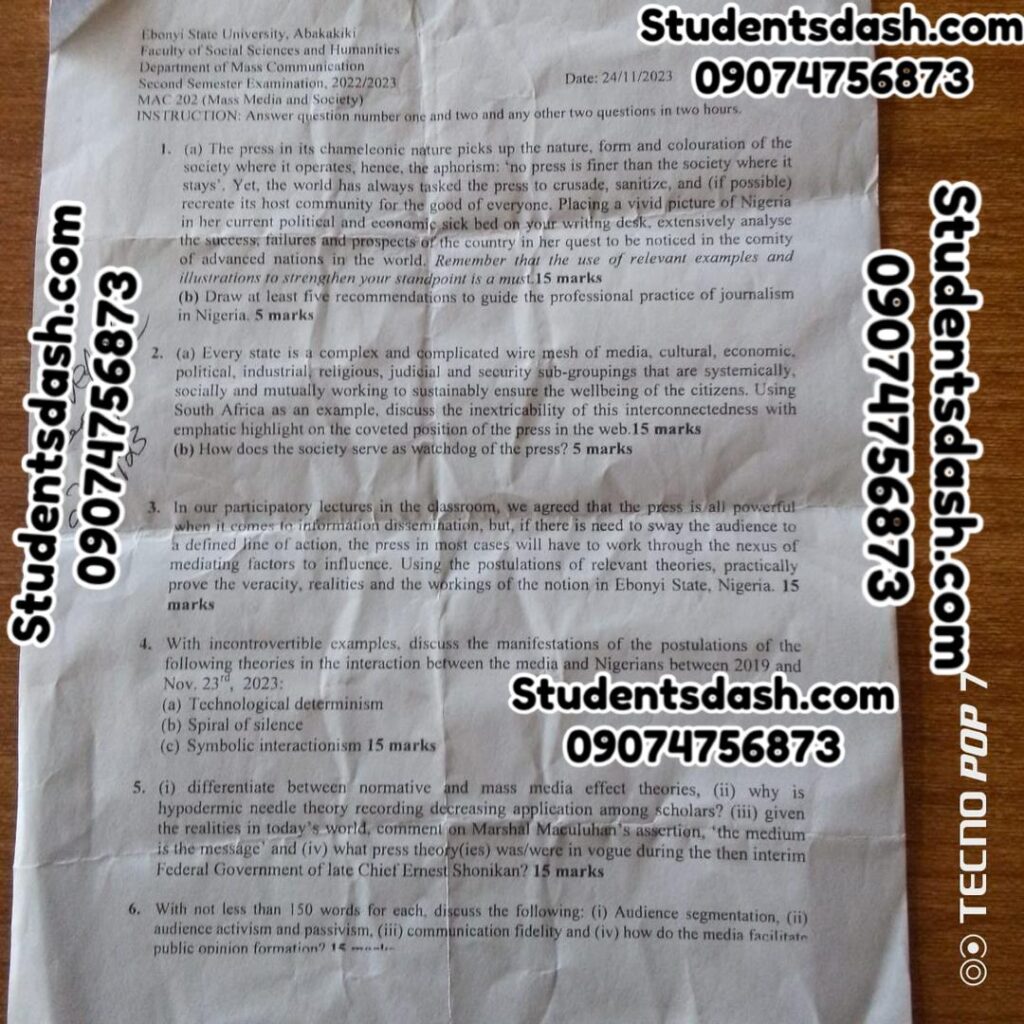
1. (a) Role of the Press in Nigeria
The press plays a vital role in shaping public opinion and fostering democracy. It informs, educates, and monitors government actions. The press has the power to influence change by exposing corruption and highlighting the need for reforms in the political system.
Successes and Failures of the Press in Nigeria:
- Successes: The press has exposed several corrupt practices and has been a voice for marginalized communities.
- Failures: Sometimes the press is used for propaganda, and journalists face threats, limiting freedom of expression.
Examples: During the #EndSARS protests, the press was critical in covering events and bringing attention to police brutality. However, certain media outlets were accused of bias.
(b) Recommendations to Strengthen Journalism in Nigeria:
- Improve journalists’ training and ethical standards.
- Protect journalists from threats and ensure freedom of the press.
- Encourage investigative journalism to hold public officials accountable.
2. (a) Interconnectedness of Media and Society
The media in Nigeria plays a significant role in shaping political, economic, and social narratives. Different groups like politicians, religious leaders, and industrialists influence media content. Using South Africa as an example, the media’s coverage of apartheid brought international attention to the struggles of the people.
Challenges: Nigeria faces similar challenges, such as political influence over media houses and biased reporting.
(b) Media as the Watchdog of Society:
The press serves as the “watchdog” by investigating government actions, exposing corruption, and ensuring transparency. However, the media is not always fully independent in Nigeria due to government interference and censorship.
3. Press Influence in Nigeria
While the press holds significant power, it cannot always freely disseminate information. There are external factors, like government restrictions and ownership biases, that limit its influence. Relevant theories like agenda-setting and gatekeeping explain how media content is controlled.
Example: During elections, media houses may prioritize covering certain political parties over others, influencing public perception.
4. Theories of Media and Society in Nigeria (2019–2023)
(a) Technological Determinism: The idea that technology shapes society’s behavior. For example, social media platforms like Twitter and Facebook influenced the way Nigerians engaged with political issues during the 2019 elections.
(b) Spiral of Silence: This theory suggests that people are less likely to express their opinions if they feel they are in the minority. During controversial issues like the #EndSARS protests, many Nigerians remained silent for fear of backlash.
(c) Symbolic Interactionism: Media symbols, like political slogans or cultural narratives, influence public perception. The portrayal of political leaders as “saviors” can affect voting behaviors.
5. (i) Normative vs. Mass Media Effect Theories:
- Normative theories focus on how the media should operate according to ethical standards (e.g., providing unbiased information).
- Mass media effect theories explore how media influences people’s thoughts and actions (e.g., hypodermic needle theory, which suggests media has a direct effect on audiences).
(ii) Hypodermic Needle Theory: This theory posits that media has a strong, immediate influence on the audience. This was evident during the rise of social media misinformation campaigns in recent elections.
(iii) Marshall McLuhan’s Assertion “The Medium is the Message”: This suggests that the medium (TV, radio, social media) affects how the message is perceived, not just the content. In Nigeria, the rise of social media has transformed political engagement.
(iv) Theories Active During Ernest Shonekan’s Interim Government: During this period, the two-step flow theory was relevant, where opinion leaders influenced public perception through media channels.
6. 150-Word Discussions
(a) Audience Segmentation: This refers to dividing the audience based on demographics (age, income, education) to target specific groups with tailored messages. In Nigeria, political campaigns often target different regions with specific messaging.
(b) Audience Activism and Passivism: Activism refers to audiences engaging with media and taking action (e.g., protests), while passivism refers to remaining passive. Social media has encouraged activism in Nigeria, such as during the #EndSARS movement.
(c) Communication Fidelity: This involves the accuracy of the message transmitted through media. In Nigeria, the spread of fake news, especially on social media, has affected trust in media accuracy.
(d) How Media Facilitates Public Opinion Formation: Media helps form public opinion by providing information and framing issues in certain ways. In Nigeria, media coverage of political events, such as elections, plays a crucial role in shaping voters’ views.